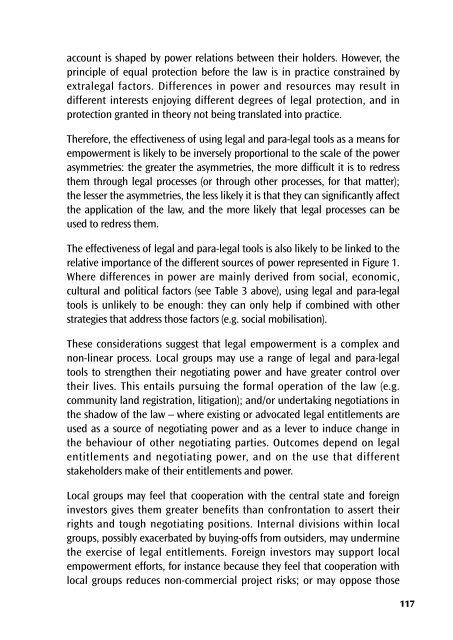Legal empowerment for local resource control
Legal empowerment for local resource control
Legal empowerment for local resource control
Create successful ePaper yourself
Turn your PDF publications into a flip-book with our unique Google optimized e-Paper software.
account is shaped by power relations between their holders. However, the<br />
principle of equal protection be<strong>for</strong>e the law is in practice constrained by<br />
extralegal factors. Differences in power and <strong>resource</strong>s may result in<br />
different interests enjoying different degrees of legal protection, and in<br />
protection granted in theory not being translated into practice.<br />
There<strong>for</strong>e, the effectiveness of using legal and para-legal tools as a means <strong>for</strong><br />
<strong>empowerment</strong> is likely to be inversely proportional to the scale of the power<br />
asymmetries: the greater the asymmetries, the more difficult it is to redress<br />
them through legal processes (or through other processes, <strong>for</strong> that matter);<br />
the lesser the asymmetries, the less likely it is that they can significantly affect<br />
the application of the law, and the more likely that legal processes can be<br />
used to redress them.<br />
The effectiveness of legal and para-legal tools is also likely to be linked to the<br />
relative importance of the different sources of power represented in Figure 1.<br />
Where differences in power are mainly derived from social, economic,<br />
cultural and political factors (see Table 3 above), using legal and para-legal<br />
tools is unlikely to be enough: they can only help if combined with other<br />
strategies that address those factors (e.g. social mobilisation).<br />
These considerations suggest that legal <strong>empowerment</strong> is a complex and<br />
non-linear process. Local groups may use a range of legal and para-legal<br />
tools to strengthen their negotiating power and have greater <strong>control</strong> over<br />
their lives. This entails pursuing the <strong>for</strong>mal operation of the law (e.g.<br />
community land registration, litigation); and/or undertaking negotiations in<br />
the shadow of the law – where existing or advocated legal entitlements are<br />
used as a source of negotiating power and as a lever to induce change in<br />
the behaviour of other negotiating parties. Outcomes depend on legal<br />
entitlements and negotiating power, and on the use that different<br />
stakeholders make of their entitlements and power.<br />
Local groups may feel that cooperation with the central state and <strong>for</strong>eign<br />
investors gives them greater benefits than confrontation to assert their<br />
rights and tough negotiating positions. Internal divisions within <strong>local</strong><br />
groups, possibly exacerbated by buying-offs from outsiders, may undermine<br />
the exercise of legal entitlements. Foreign investors may support <strong>local</strong><br />
<strong>empowerment</strong> ef<strong>for</strong>ts, <strong>for</strong> instance because they feel that cooperation with<br />
<strong>local</strong> groups reduces non-commercial project risks; or may oppose those<br />
117

















